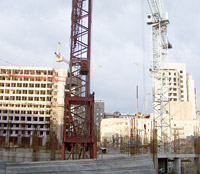Construction business that is one of the most progressive businesses in Armenia is going to be taxed starting from 2007. Furthermore, the budget of 2007 includes a specific package on how construction field should be taxed.
There are separate construction fields that are taxed, but generally the construction works are not taxed. Most of the construction capacity is concentrated in the business of constructing elite buildings and is considered to be very profitable. It is hard to find any business in Armenia that may have 100-250% profitability (this is how much the business of constructing elite buildings is). Businesses or people earn $200-350 per $100 they have invested in construction. Thus, it means that businesses have $100-250 profit per $100 invested. This is the income that the government is going to tax starting from 2007.
During the past 5-6 years this field has developed much in Armenia, thus the businesses involved in that field have made much money too. It would be logical to say that in parallel with that growth as well as the tax incomes would grow, however all that field has not been covered by the tax inspection so far and they have not paid money to the government. There have been several attempts to tax this field in the past too, even there were some recommendations to tax according to the flat sizes that are sold. Nevertheless, the mentioned bill was not brought up in the parliament. Anyway, this year the government has decided to tax construction businesses “by improving the existing taxations tools”. Yesterday RA taxation department deputy head Armen Alaverdyan discussed these issues with journalists in a meeting in the economic journalists’ club.
“It is spoken much that construction businesses don’t pay their dues. Those estimations are mostly sensitive and are not based on concrete facts” said Mr. Alaverdyan. He also does not agree with the idea that those businesses make profits more by three times than the money they have invested. “I agree that it is a profitable business type, but I don’t think they have 100 or 200% profitability” says A. Alaverdyan, “It does not have 100% profitability. I don’t mean that they lose, but I think the median profitability is not less than 30%”.
Mr. Alaverdyan thinks that the budget has not lost much from not taxing construction since the mentioned sector is not so big. There are many building constructions in Yerevan that are still in process and have not been finished yet. Today 40-45 high-storey buildings are still being constructed. Furthermore, there are several buildings that have finished all the construction works but have not sold most of the apartments. “At least it is investment; they invest money, have risks and expect to have profits. We can’t tax them as far as they haven’t sold the apartments and have not got their profits” says A. Alaverdyan, “Investments are mostly made by credit resources, which should be handled as well. Please make your estimation in consideration of these factors as well”.
Mr. Alaverdyan said that when they start taxing construction they will tax only when the apartments are sold and according to the size. Thus, the other places that are for common use or other use will not be taxed. Generally, when Mr. Alaverdyan was speaking about the problems of constructions businesses and how they should be taxed it seemed that they were doing their best not to tax them much. Mr. Alaverdyan says that when defining the sums of taxes to be taken they will make their calculations basing on the cadastre prices. However, if they find out and prove that they have sold the apartments at higher prices than registered in the cadastre, they will tax the real prices the apartments have been sold at. It is more possible that businesses will register lower prices and keep the real prices untaxed. This is the way how lands are privatized, i.e. the prices that are registered in the cadastre department are lower than the real prices the lands are sold at. Hardly the taxation department may tell Samvel Mairapetyan and Gagik Tsarukyan that they have sold their buildings at higher prices than the ones registered in the cadastre department. The existing method of “improved taxation tools” is very simple and it seems that it is made so that they don’t take much money from construction businesses. As for the income that construction businesses have, it is too big in consideration of the fact that most of the investors in construction in Armenia are foreigners that are free of income tax for two years. As for those foreign investors, mostly they are not foreigners since the local businessmen can register their businesses in the name of foreigners and have certain privileges. “Those businessmen use their opportunity provided by the existing law, which is legal. We have always been against providing any taxation privileges. However, those privileges exist and businesses use that opportunity” says the deputy chief of the Armenian taxation department.
It is hard to say whether the mentioned new system of tax collection is better than the previous one. It is difficult to understand whether this new law is better than the previous one, notwithstanding it is clear that they do their best not to take much money from construction businesses as they have done in the past too. Mr. Alaverdyan says that 10 buildings will be exploited in 2007. He didn’t say the sum of the tax collection expected, however he said that it would be several hundred million dram.

